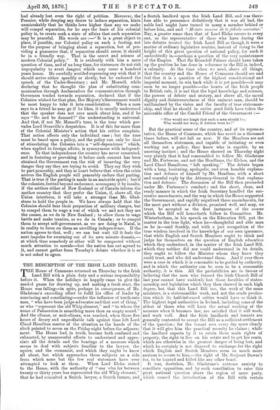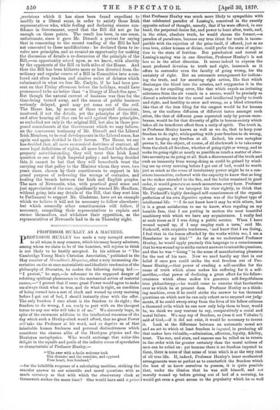THE RESUMPTION OF THE IRISH LAND DEBATE. T HE House of
Commons returned on Thursday to the Irish Land Bill with a plain duty and a serious responsibility before it. When the holidays so happily came to give the needed pause for drawing up, and making a fresh start, the House was falling—in spite, perhaps in consequence, of Mr. Gladstone's exceeding effort to fulfil his office of leader by convincing and conciliating—under the influence of tenth-rate men, " who have been judge-advocates and that sort of thing," or who "represent the old Whig element," and " to whom the name of Palmerston is something more than an empty sound." And the climax, or anti-climax, was reached, when those five hours of dreary and unprofitable talk against time left Lord Claud Hamilton master of the situation as the hands of the clock pointed to seven on the Friday night before the adjourn- ment. The House had, in truth, become both confused and exhausted, by unsuccessful efforts to understand and appre- ciate all the details and the bearings of a measure which seems to deal with subjects familiar to the lawyer, the squire, and the economist, and which they ought to know all about, but which approaches those subjects on a side from which none but the few real statesmen have ever attempted to look at them. When Lord Elcho stated to the House, with the authority of "one who for between twenty or thirty years has represented the old Whig element," that he had consulted a Scotch lawyer, a Scotch farmer, and a Scotch landlord upon the Irish Land Bill, and was there- fore able to pronounce definitively that it was all bad, the noble lord might have turned to many a member behind or before him, and said "Ablate nomine de le fabula narratur." Nay, a greater name than that of Lord Elcho occurs to every one, as the representative of those who have during the late debates treated the Irish Land Bill as though it were a matter of ordinary legislative routine, instead of rising to the height of this great question of national policy, for such it undoubtedly is,—perhaps a question of the very maintenance of the Empire. That Sir Roundell Palmer should have taken up the position he has done in reference to the Bill is, indeed, a calamity. At the time when we need, above all things, that the country and the House of Commons should see and feel that it is a question of the highest constitutional and imperial moment, to win back while it is yet possible—it may soon be no longer possible—the hearts of the Irish people to British rule, it is sad that the legal knowledge and acumen, the powers of debate and oratory, and above all, the moral dignity and disinterestedness of this eminent man, should be unillumined by the vision and the faculty of true statesman- ship, and that he should in entire good faith have taken the miserable office of the Candid Friend of the Government
Who would not laugh that such a man should be ; Who would not weep, if Atticus were ho !"
But the practical sense of the country, and of its represen- tative, the House of Commons, which has saved us ,a thousand times before, will not fail us now. If the Members are not all themselves statesmen, and capable of initiating or even working out a policy, they know who is capable, by an unerring instinct ; and the House showed on Thursday night very plainly that it had reassembled to follow Mr. Gladstone and Mr. Fortescue, and not the Headlams, the Elchos, and the Lord Claud Hamiltons, " left speaking." The debate began with a long, hesitating, apologetic, and even humble explana- tion and defence of himself by Mr. Headlam, with a short and scornful reply by the Attorney-General to that explana- tion and defence. The discussion of the Bill then proceeded under Mr. Fortescue's conduct ; and the short, clear, and ready manner in which the Irish Secretary handled the suc- cessive amendments, and the way in which the House supported the Government, and rapidly negatived those amendments, for the most part without a division, promised well, and may, we trust, be accepted as the first instances of the course which the Bill will henceforth follow in Committee. Mr. Winterbotham, in his speech on the Education Bill, put the matter in the true light, when he—thoughtful and able man as he is—said frankly, and with a just recognition of the true wisdom involved in the knowledge of our own ignorance, that while English and Scotch Members ought to think and judge for themselves on the question of English education which they understood, in the matter of the Irish Land Bill, which they neither did nor could understand in its details, they ought to follow the Minister whom they knew they could trust, and who did understand them. And if ever there were a case in which it is reasonable to be guided by authority, and in which the authority can be seen to be a reasonable authority, it is this. All the probabilities are in favour of believing that the men who framed the Irish Church Bill of last year cannot have suddenly lost those faculties of states- manship and legislation which they then showed in such high degree, but that this Land Bill too, the work of the same ministers, is a statesmanlike work, and not the crude produc- tion which its half-informed critics would have us think it. The highest legal authorities in Ireland, including some of the ablest of those who will have the actual working of the measure when it becomes law, are satisfied that it will work, and work well. And the Irish landlords and tenants are generally contented to accept the Bill as a sufficient settlement of the question ; for the tenant sees every day more clearly that it will give him the practical security he claims ; while the landlord expects by it to retain those main rights of property, the right to live on his estate and to get his rents, which are otherwise in the greatest danger of being lost, and which he certainly is not disposed to exchange for the right which English and Scotch Members seem so much more anxious to secure to him,—the right of Mr. Serjeant Dowse's fox, to be hunted and killed like any other beast.
It was, doubtless, Mr. Gladstone's extreme anxiety to conciliate opposition, and by such conciliation to raise this great national question above the region of mere party, which caused the introduction of the Bill with certain 2rovisions which it has since been found expedient to modify in a liberal sense, in order to satisfy those Irish representatives who, while feeling and declaring sincere con- fidence in Government, urged that the Bill did not go far enough on those points. The result has been, in one sense, unfortunate, since it gave Mr. Disraeli a pretext for saying that in consenting to the second reading of the Bill he had not consented to these modifications : he declared them to in- volve new principles, and so created an opportunity for making the discussion of details a re-discussion of the principle of the Bill,—an opportunity seized upon, as we know, with alacrity by the opponents of the Bill on both sides of the Honse. And thus the Bill has been hitherto more or less diverted from the ordinary and regular course of a Bill in Committee into a con- fused and often random and aimless series of debates which culminated in what we fear Mr. Carlyle, if he had been pre- sent on that Friday afternoon before the holidays, would have pronounced to be no better than " a liturgy of Dead-Sea apes." But though the natural current of business was thus for the time-being turned away, and the course of public business seriously delayed, good may yet come out of the evil. The House has, by means of these repeated discussions, mastered, if not the details, yet the principles of the Bill ; and after hearing all that can be said against those principles, as embodied not only in the original Bill, but also in those pro- posed amendments of the Government which we may believe, on the concurrent testimony of Mr. Disraeli and the Liberal Irish Members, to be real developments in the Liberal sense, has again and again decided in their favour. The House, we say has decided that, all mere economical doctrines of contract, all mere legal definitions of rights, all mere landlord beliefs about property notwithstanding, they will treat this Irish Land question as one of high Imperial policy ; and having decided this, it cannot be but that they will henceforth trust the carrying out that policy to the Minister whom they were, two years since, chosen by their constituents to support in his grand purpose of redressing the wrongs of centuries, and healing the breach between the Irish and English peoples. The men of Newcastle, who, with practical good sense and just appreciation of the case, significantly warned Mr. Headlam, without going into any details of the Bill, that they sent him to Parliament to support Mr. Gladstone, have set an example which we believe it will not be necessary to follow elsewhere; but which assuredly other constituencies will follow, if necessary, compelling their representatives to explain and excuse themselves, and withdraw their opposition, as the representatives of Newcastle had to do on Thursday night.



































 Previous page
Previous page